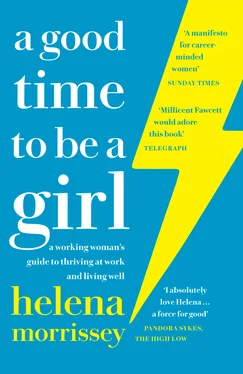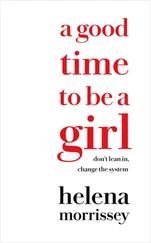The third essential ingredient behind my newfound career success was the true partnership with Richard. My career setback after our first son was born had not put us off having more children. Both Richard and I had grown up in small families and shared a romantic vision of the happy chaos of a large number of children. When we married we said we would love to have five. Neither of us is from a wealthy background and we had to be self-sufficient. Fulfilling our dream of a big and happy family involved some stresses, including financially, although we were conscious that this was our choice.
We had not planned to start our family so quickly, but were young, rather relaxed and, as it turned out, able to produce babies rather easily (or, at least, conceive). Our first child, Fitzroy, was born ten months after our wedding. Young women often ask me when is a ‘good’ time to have a baby. I always say there is no ideal time, although I am grateful that we started to have our children when we were young by today’s standards. We weren’t perhaps ready, but as first-time parents do, we learned quickly.
The financial struggles when Fitz was born were challenging, though. We were amongst the many young professionals who had borrowed money in the late 1980s to buy a small flat, only to see interest rates soar and our mortgage payments balloon, while property prices collapsed. Neither of us had a high salary and for a while, our outgoings outstripped our earnings, a clearly unsustainable situation. One income was not enough to cover the mortgage so we both needed to work full-time, but our only realistic childcare option was a day nursery near my office. The nursery fees were around a quarter of our after-tax income before we had paid even a penny of the outsized mortgage bill. That first year I returned to work after having Fitz was tough, particularly when I didn’t get the promotion that might have eased our financial strain, but the experience also made us very determined. My new job at Newton came with a salary rise and Richard found a higher-paid position too. Mortgage rates came down and although our flat was worth far less than we had paid for it, bigger properties had suffered even larger price falls, so we were finally able to move.
Buying a modest house enabled us to hire a wonderful nanny, Paula, who stayed with us for more than twenty years. She always lived out, which gave us precious family time together and space for her, but meant that either Richard or I had to be home before she left at 6 p.m. Richard was a financial journalist and had multiple daily deadlines so I would always do the morning shift, waiting until she arrived at 7.30 a.m. Paula was incredibly reliable, but every day I felt anxious about getting to the office on time by public transport.
There was no slack at all in the arrangement, no room for error or lateness, and the stress of us both rushing in and out of the home, often distracted by work when we were there, trying to ‘do it all’, was taking its toll, including on our relationship. Richard and I needed to work out how not just to survive but to be happy. We took our time having our second and third children, who were born more than three years apart.
It is a big part of our story that when we were expecting Millie, our fourth, who was born just a year after our third child, both Richard and I knew something had to change. With another baby on the way we felt at breaking point and one evening discussed how we could possibly make it all work. Richard volunteered to go freelance and work from home: he would be able to play a bigger role in bringing up our family. He also wanted a freer existence, having never enjoyed office politics. Over time, as we had yet more children, his opportunity (and desire) to take on paid work dwindled and he became a full-time, stay-at-home dad.
This reversal of traditional roles was ahead of its time: Millie is now at university. It has not always been perfect (nothing is) but it has been key to our ultimately happy family life as well as helping my career. At the beginning, we were completely open as to how things might evolve – neither of us knew whether we would be able to afford the arrangement becoming permanent. We definitely had to be careful about money: ‘staycations’, for example, were a necessity rather than a choice and it was a long time before we could decorate our new home. These were minor sacrifices for our happier family life.
Both of us feel confident that the set-up has been beneficial to the children: Richard enjoys being at home, is completely dedicated to being at every sports fixture, likes cooking and (most of the time) doesn’t mind the endless chauffeuring. It’s been wonderful for me to know that the children have been benefiting, both logistically and emotionally, from one parent being at home. Meanwhile, since I have always wanted to be home whenever possible, throughout my career I have been disciplined about leaving the office in time for family suppers most evenings. This time together at the end of each day has always been an important part of our family life.
Of course, with nine children, it would have been impossible for me to get to all (or even most) of the school plays, concerts and ballet performances, so I have prioritised those events that are each child’s ‘special’ thing. I do regret missing certain moments, especially not being there when someone simply wants to talk, but I know it has been a good arrangement overall. We cannot attain perfection, and to strive for it is a recipe for feeling inadequate. Most importantly, our children are happy and thriving (at least most of them, most of the time). Some of my male peers never see their children during the week – a situation that would make both my family and me quite miserable.
Ours is still an unusual arrangement and I often get asked about it, including questions about whether I feel guilty (not exactly helpful at those moments when I do) and how I ‘have it all’. When I guest-edited BBC Radio 4’s Today programme in December 2016, I asked five high-powered men, ranging from bestselling author Michael Lewis to the chairman of Barclays Bank, John Mcfarlane, how they balanced work and family life. All of them said it was a question they had never been asked before. It was also interesting that none of them answered that it was all possible thanks to their wonderful wife or partner. I suspect this was for fear of seeming politically incorrect, although I feel completely able to credit Richard for making it all possible, and he is praised for his modernity.
I realise now that the conversation Richard and I had all those years ago about how, together, we could make it all work is still quite uncommon. It’s a very personal matter for each family to work out how to bring up children with love and time, how to earn enough money, develop careers, contribute to the community and, hopefully, have time for wider family, friends and fun. Working together to make things as good as they can be, whatever role each of us plays, is crucial to building a happy life together. When she was CEO of the Financial Times , Rona Fairhead was asked for one piece of advice for girls. ‘Marry well,’ she said, before explaining that she didn’t mean marry someone wealthy, but someone who understands you, who is a genuine partner.
We do not always have the luxury of choice and I am very conscious that not everyone can find a true partner in life. Sheryl Sandberg tragically became a single mother when her 47-year-old husband died suddenly: she has since spoken poignantly of her awareness that the chapter entitled ‘Make your partner a real partner’ in her influential book Lean In does not always apply. (Sandberg also realised through her terrible loss that it is very hard to ‘lean in’ when life is difficult; in her own words, ‘Lean in? I could barely stand up’).
Читать дальше



![Scott O’Hara - Five-Star Fugitive [= Border Town Girl]](/books/432138/scott-o-hara-five-thumb.webp)








